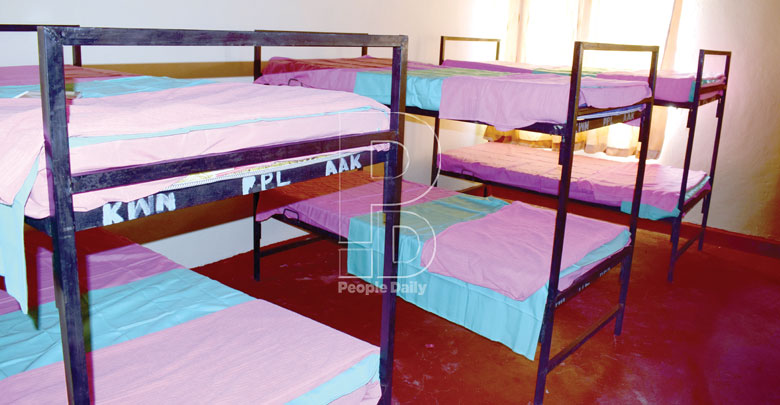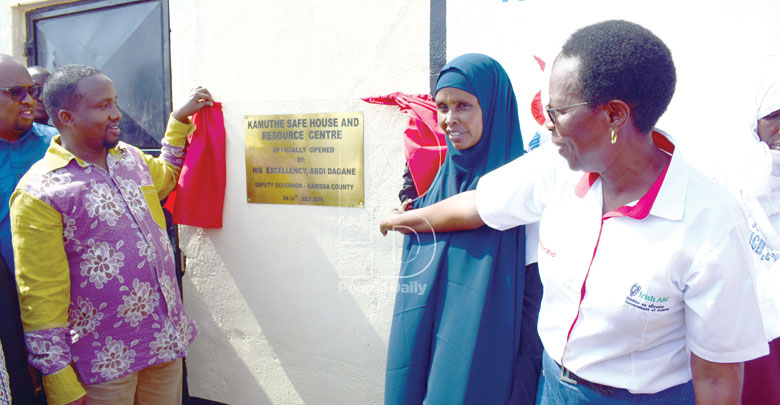Sexual exploitation: Garissa’s safe haven for vulnerable girls
By Milliam Murigi, August 21, 2019
As much as Kenya has made commendable progress in establishing mechanisms to protect children from abuse such as violence, sexual exploitation, child marriage, and Female Genital Mutilation (FGM), thousands of children in Garissa still experience gross violations of their rights.
Worse, many of them have no idea where or who to turn to when they face these situations, exposing them to revictimisation and other violations. It is against this background that ActionAid International Kenya, a leading anti-poverty agency, joined hands with a local women’s network in Garissa to build a safe house and a resource centre at Kamuthe to rescue such children.
Run by the Kamuthe Women Network with support from ActionAid and other donors, the facility was funded by People’s Postcode Lottery at Sh7.5 million. It is located at Kamuthe Primary School, Fafi constituency, Garissa county.
It has been equipped to host around 80 girls below the age of 18, who are rescued or have run away from home because of FGM and child marriage, which makes it impossible for them to attend school.
ActionAid International Kenya Executive Director, Makena Mwogobia, says the idea of a safe house came from the women. While they were willing to end the vice and other child right violations, the local women, unfortunately, didn’t know what to do with the children they rescued.
Baseline study
“We conducted a baseline study in 2012 and found out that violence against women and girls was high in Garissa county. However, at Kamuthe village, women had already identified a solution: setting up a safe house where such girls could be housed. However, they couldn’t afford to construct one and that is when we decided to join hands,” says Mwogobia.

FGM prevalence in Garissa county is at 98 per cent—the highest in the country. Comparably, the national prevalence stands at 21 per cent, according to the 2014 Kenya Demographic and Health Survey.
Communities such as the Maasai, Somali, Kisii, and Samburu bear the brunt of this violation declared illegal in 2011. Nonetheless, it is still practised in secret, violating the rights of thousands of girls and women.
To the organisation, the safe house is just a temporary measure, as stakeholders advocate for a violence-free environment. “To end FGM and other violations we are using a holistic approach.
We are working with practitioners of FGM who are ready to stop if given an alternative livelihood option. We also work with cultural and religious leaders and law enforcers. With this approach, our work has started bearing fruit,” Mwogobia adds.
She reveals that the community believes religious beliefs and practices have worked against women and girls in the region. “We have been engaging various leaders to get to know the source of this tradition, specifically focusing on FGM.
In Garissa, the practice is believed to be tied to religion, but working with the leaders, we realised it is not true. Now, we are using these leaders to talk about it because the community listens to them,” she adds.
Sneaked in
Sheikh Hussein Mahat, an Islamic scholar in the area, says the practice, commonly witnessed among the Somali, has nothing to do with religion. Islam is against the cut and it is nowhere in the Holy Quran or in countries where the religion started. Mahat adds that it is purely a cultural practice sneaked into the religion by a few selfish individuals.
The safe house incorporates a resource centre where the girls will learn technical skills needed in Garissa market such as tailoring, baking, leadership training and value addition of some farm products, with banana as the current target.
So far, two girls have been rescued, but since the facility was officially handed on July 24, a member of the network houses them waiting for their transfer.
Apart from housing girls at risk of abuse, the operators plan to house girls from vulnerable backgrounds who cannot afford to go to school for different reasons.
“This facility is timely because it is only a few months to the start of the peak season- December holidays. I would urge all girls at risk of FGM and forced marriage to run to this centre. You will be protected and continue with your education,” Mwogobia adds.
Beyond protecting and offering educational and vocational training opportunities to the girls, the rescue centre, which will also house girls from neighbouring counties such as Tana River, will also try to reconcile them with their parents and communities.
